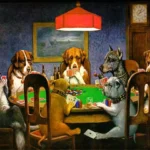Whenever I bring up the subject of trading in the stock markets, someone almost always asks the question “Isn’t that risky?”
While it’s true that there are certain limited ways to occasionally obtain risk free profits, for the most part, trading in the stock markets is a risky endeavor – in fact, it needs to be.
Risk free profits (also known as arbitrage) disappear almost as soon as they appear, and are generally speaking out of reach for the majority of people, notably those who don’t have direct access to market exchanges, in order to front-run the competition.
For the rest of humanity, you can’t make any guarantee that every single trade will be a winning one. Fortunately, you don’t have to. All you need is an edge – even if it’s just a small one.
The late Dr. Van K. Tharp covers a lot of Risk/Reward concepts and metrics in his books and if you are seriously thinking about becoming a trader, I would definitely recommend reading about how to use Position Sizing to your advantage.
You can see Van Tharps book list here – https://vantharp.com/vans-books/
In my previous article I talked about gambling, and how the casino has an advantage – as long as the game keeps on playing, they are mathematically guaranteed to win over time, due to their small edge.
So, what edge do I utilise in the markets?
First of all, I take trades that I am more likely to win, by sticking to a specific set of trading rules, and only entering a position once certain criteria are met.
Secondly, the downside is capped – I know before I put on a trade what the most amount of money is that I can lose on that trade, no matter what happens.
Finally, the upside is unlimited – for the times that we are right – especially when we are really right, it helps to have no upper bound on what can be made.
Therefore, we mostly profit from the tail end of the distribution (in regard to returns), but can never get hurt by it on the opposing side (due to limiting risk – usually via options contracts).
Taking a completely randomised distribution of returns, the simple act of limiting our losers and letting winners go unbounded, means that if we were only right 50% of the time, we could still make a profit in the markets.
In fact, if I am wrong 70% of the time in my own system, I should still be able to breakeven.
As long as correct money management is employed, then it’s possible to stay in the game long enough for an edge to turn a profit.
Indeed, there are no guarantees in life, well, except for death and taxes.
However, you should be taking risks in life, as long as they are managed risks. There’s no need to bet the farm on the turn of a single card, or on the performance of a single stock.
When looking back upon their lives, a hospice care worker (Grace Bluerock – https://www.mindbodygreen.com/articles/the-most-common-regrets-people-have-at-the-end-of-life) found that dying men and women expressed several common regrets, with some of the most common being that they:
- Wished they had been more loving to the people that mattered most
- Wished that they had been happier, and enjoyed life more
- Wished that they had lived their dream
Another one of the most commonly expressed regrets was that they wished they had taken more risks in life.
Sometimes, I guess the greatest risk that you can take in life, is to take no risk at all.








